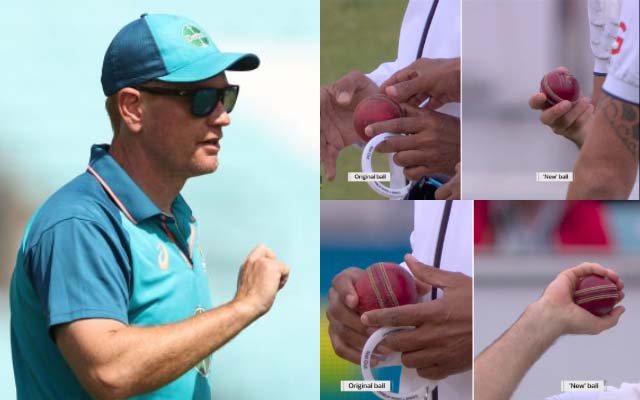
Australia’s performance on day five at The Oval fell short of Andrew McDonald’s expectations, as the coach acknowledged. However, a momentous turning point emerged when a controversial ball change dramatically reshaped the course of the final match.
The decision by England to replace their 38-overs-old ball which had lost responsiveness with a fresh, shinier substitute yielded a strategic response that even McDonald found astonishing. While admitting his team’s need for better adaptation, McDonald recognized the match-altering impact of the unprecedented ball switch, marking a defining act in the game.
Ricky Ponting, the former captain, expressed strong dissatisfaction with the replacement ball selected by on-field umpires Kumar Dharmasena and Joel Wilson, labeling it as a significant blunder. Ponting emphasized the need for a thorough investigation into the circumstances surrounding the seemingly straightforward decision to swap the old ball for a new one.
Meanwhile, Australian opener Usman Khawaja, inadvertently at the center of the controversy due to a forceful blow from England’s Mark Wood, remarked that the subsequent ball’s hardness surpassed that of any new ball encountered during the entire series.
Following his team’s 49-run defeat in the Test, solidifying a 2-2 Ashes series tie with Australia holding onto the urn, McDonald highlighted England’s swift adaptation to the nearly new ball.
Preceding this alteration, England’s bowlers aimed to elicit reverse swing from the less cooperative older ball, employing a slip cordon ahead of batters Khawaja and Warner. The duo’s record-breaking opening stand set the stage for Australia’s pursuit of a 384-run victory target.
As play resumed on Monday morning, less than two overs were faced against the replacement ball before rain interrupted the proceedings on Sunday evening. In the opening hour, as the ball exhibited substantial movement in the air and off the surface, three wickets fell, all taken behind the wicket.
“I’ve never seen tactics shift so dramatically on the back of a decision,” remarked McDonald when speaking to Cricket.au, emphasizing the remarkable change in strategy. The adjustment transitioned from having fielders in front of the wicket to positions behind, altering the game’s shape and tactical approach.
“The ball change did significantly impact the tactics and England’s approach. That ball change did have a significant bearing on the tactics, the way that England went about it. But in saying that, I think we still should have been able to navigate that. There were two clumps where we lost 3-30 and 5-30, and that’s part of us owning it. The umpires are out there to make a decision and they had a box of balls to choose from, and they made the best decision at that time from what they saw was there,” acknowledged McDonald.
The ICC chose not to provide a comment on the specific incident at The Oval but highlighted the well-defined protocols governing the replacement ball’s selection.
Despite the opening and closing batting collapses curtailing Australia’s quest for their first UK Ashes series victory since 2001, McDonald lauded the “fascinating” series and commended his players’ accomplishments. He also thanked the dedicated Australian fans for supporting matches in the early hours.
Last Updated on August 2, 2023

Senior Sports Copywriter






